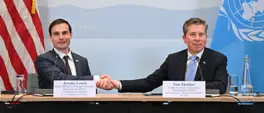NPA being unfairly judged on its ability to prosecute state capture & complex corruption matters - Batohi
Lindsay Dentlinger
11 October 2024 | 10:50Shamila Batohi said that the organisation was making significant strides in laying a strong foundation for the future, having also suffered the effects of state capture.
CAPE TOWN - The National Prosecuting Authority (NPA) says its performance is being unfairly judged purely on its ability to prosecute state capture and other high-profile corruption matters.
The national director of public prosecutions, Shamila Batohi, on Friday told Parliament that the institution was performing the best it had over the past five years.
Presenting the NPA's annual report, Batohi said that the entity would not bow to public pressure on state capture cases because it had to behave responsibly before enrolling such complex matters.
As the NPA nears the end of its five-year strategic plan, Batohi said that the organisation was making significant strides in laying a strong foundation for the future, having also suffered the effects of state capture.
"The NPA has been subjected to often harsh criticism in respect to one aspect of our work, a very important aspect, namely the prosecution of state capture and complex corruption matters."
Thirty-nine state capture cases are currently before the courts.
Over the past five years, almost 700 government officials and over 1,000 private sector individuals have been convicted of corruption.
"The NPA cannot rush or be seen to be rushing against these cases. We will then be accused of targeting people. The reality is, all over the world, convictions in complex corruption cases take many years."
But former prosecutor turned Democratic Alliance (DA) MP, Glynnis Breytenbach told Batohi that just a single, successful state capture conviction would change the public perception.
Get the whole picture 💡
Take a look at the topic timeline for all related articles.












